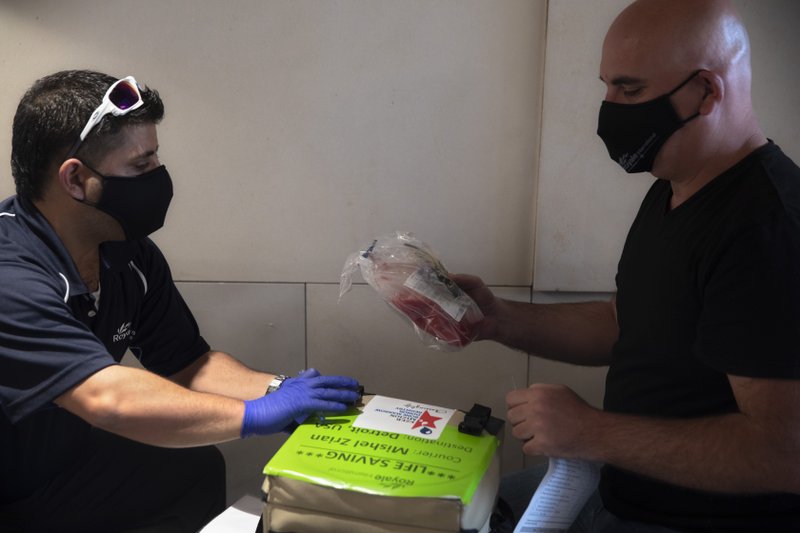PETAH TIKVA, Israel -- Ordinarily, delivering a bone marrow transplant to a far-flung destination is simple. But according to the World Marrow Donor Association, donor registries and transplant centers around the world have been grappling with how to navigate the new rules under coronavirus restrictions.
Over the past two months, as air travel ground to a halt, Mishel Zrian has crisscrossed the Atlantic and the United States dozens of times, sleeping in empty airports and unable to return home to see his family in Israel, all in a race against time to deliver life-saving transplants.
Zrian is a courier hired by Israel's Ezer Mizion bone marrow donor registry, which has had to perform logistical acrobatics to get its transplants to their destinations amid the travel disruptions caused by the pandemic. The nonprofit, as well as others involved in coordinating transplants around the world, has been tested by the shortage of flights and restrictions on travel, forced to find creative solutions or risk the health of patients.
The drop in flights has also affected the U.S., where kidneys, the most common transplant in America, are often flown across the country and need to reach patients within 30 hours. Other organs typically travel on private planes.
[CORONAVIRUS: Click here for our complete coverage » arkansasonline.com/coronavirus]
For those in need of a bone marrow transplant -- usually cancer patients -- finding the right DNA match is difficult and often requires the help of international donors.
Timing is critical. At the start of the transplant process, the patient's own bone marrow is removed; if the transplant is not provided within 72 hours, the patient could die.
In one case, an Italian military plane was called up to deliver a transplant from Turkey to a 2-year-old patient in Rome. Germany, Italy and the U.S. set up special exchange points at military bases to allow couriers to drop off and pick up transplants there rather than have them enter the country by way of civilian airports.
As flights to Israel became scarce, Ezer Mizion's transplants were sent to Europe via Belgium by cargo flights and then driven to their final destination. A daily commercial flight out of Israel to the U.S. has allowed the organization to continue its deliveries, but within the confines of the chaos wrought by the pandemic.
[Gallery not loading above? Click here for more photos » arkansasonline.com/530travel/]
Zrian, the nonprofit's main U.S.-bound courier, left Israel for what was supposed to be a brief journey in mid-March, only to be told upon his return that he would need to remain in quarantine for 14 days, according to Israeli rules on all incoming travelers.
At that point, Ezer Mizion appealed to the Israeli Health Ministry and the National Security Council, and managed to secure Zrian special entry to the country, as long as he didn't leave the airport.
He is allowed to sleep in an airport lounge between flights and receive his deliveries without being forced to quarantine. With airport restaurants closed, Zrian subsists on fast food while in the U.S. When he returns to Israel, he gets to have more lavish meals at the airport lounge.
The 47-year-old hasn't seen his two teenage sons in more than 70 days, and his wife was granted only one airport visit during that time.
Zrian, who works for courier company Royale International, has flown with his precious cargo more than 50 times since mid-March, often the only passenger on the plane and landing at deserted airports. While he sometimes sleeps at his destination, his life moves to the beat of his deliveries. He recently spent six straight nights on flights.
"I miss my family," he said. "But I always carry the transplant with me and I know I am doing the right thing."
A Section on 05/30/2020
